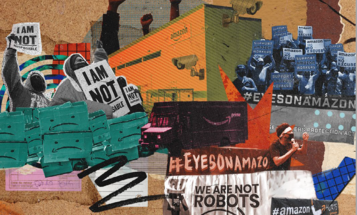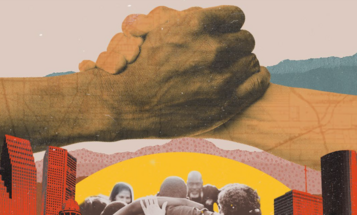
Why Any Legitimate Climate Change Policy Must Have Racial Justice at Its Core
The future of our planet demands we recognize inequity and prioritize those communities who have been most impacted by climate change.

Policymakers must recognize that the burden of climate change has been borne by low income communities and communities of color.
Climate justice is making national and global headlines this month. On the tail of the devastation wrought by Hurricane Dorian in the Caribbean, movements and organizers continue to mobilize for action to address climate change and disaster relief, while presidential hopefuls are being charged with confronting the crisis. Earlier this month, candidates discussed their positions on the issue of climate change at the CNN Town Hall and this week the world will participate in a climate strike. Voters will also have another opportunity to hear exclusively on this issue from the candidates during the MSNBC Forum on climate change.
Last week the third Democratic Primary debate was hosted in Houston, TX, a city recently devastated by Hurricane Harvey and continuously the site of “500-year” floods, bringing the issues of climate change to the front of my mind. Currently, over half of the field has put forth plans on this issue, one of the only topics where this is the case. While each of the ten candidates who were on stage have released climate and environmental policy proposals, the debate spent only one question and a few minutes out of the three hours of coverage on the climate crisis. Acknowledging the problem, listening to scientists, and following their recommendations is not enough to demonstrate a full understanding of the crisis in front of us and the solutions we need to truly address it.
What must be confronted is that “climate change and inequality are interconnected in the social structure of our economy, especially by race and class.” The disparate impact on black and brown communities is as undeniable as climate change itself. During the debate we heard candidates outline their plans to confront climate change and a few lines about rejoining the Paris Agreement, using the power of trade to hold China accountable, the urgency of reducing our emissions by 2050, and decreasing our dependency on fossil fuels. Only once did a candidate discuss how communities of color are disproportionately harmed by fossil fuel pollution, only once did we hear the term “environmental justice” even mentioned. Stemming from a question on segregation, New Jersey Senator Corey Booker highlighted the disparate impact felt by communities of color: “my kids are not only struggling with racial segregation and housing and the challenges of underfunded schools, but they’re also struggling with environmental injustice.” This could have led to a debate on how fossil fuel dependency and the climate crisis are not colorblind environmental problems. These are racist social inequity problems and can only be solved if understood and addressed as such.
We need to demand that leaders address the climate crisis as a crisis of racial and economic injustice.
It’s not enough for a candidate, elected official, etc., to put forth a plan that reduces our emissions. We need to be holding these officials accountable to higher standards of harm prevention, justice, and prioritize resiliency for the most impacted communities. We must ask, do they reconcile the fact that the burden of climate change has been borne by low income and communities of color? Are they centering front line communities and committing the benefits of investment to go to them first? Is there a lens for the intersectionality of this issue beyond energy? Are they willing to give communities more than a seat at the table, but instead follow their lead? As tens of thousands of young people and adults call for urgent action during this week's climate strikes, as one more forum airs to center the climate crisis on cable television, and a year of campaigns ahead looms, we need to demand that our leaders address the climate crisis as a crisis of racial and economic injustice, centering reparative solutions for people of color and the communities so severely impacted by this crisis.




